On Sunday, June 22, Prague will commemorate a century of public bus service with a parade of vintage and modern buses through the city’s historic center.
A total of 19 vehicles, ranging from the 1920s to the present day, will take part in the rolling celebration.
The event begins at 9:00 a.m. on Old Town Square, where all the buses will be on display for one hour. Visitors will have a rare opportunity to explore the vehicles up close and capture photographs before the convoy begins its journey.
At 10:00 a.m., the parade will depart from Staroměstské náměstí—where Prague’s bus history officially began 100 years ago—and travel to its final destination at Vítězné náměstí in Dejvice.
The route includes several designated photo spots, giving residents and visitors the chance to witness this unique mobile exhibition along key streets of the capital.
At Vítězné náměstí, the buses will remain on display until 3:30 p.m. as part of a wider event organized by the Museum of Public Transport in Prague, which will also present other exhibits and a full program of activities for families and enthusiasts.
Leading the convoy will be the Škoda 506 N, the oldest bus in the parade, dating back to 1929. It will be joined by iconic models such as the Škoda 706 RO (1951), Jelcz 272 (1973), Karosa ŠM 11 (1961), and the Ikarus 280 (1973), among others.
The parade pays tribute to the evolution of urban transport in Prague, offering a rare live exhibition of the city’s mechanical heritage.
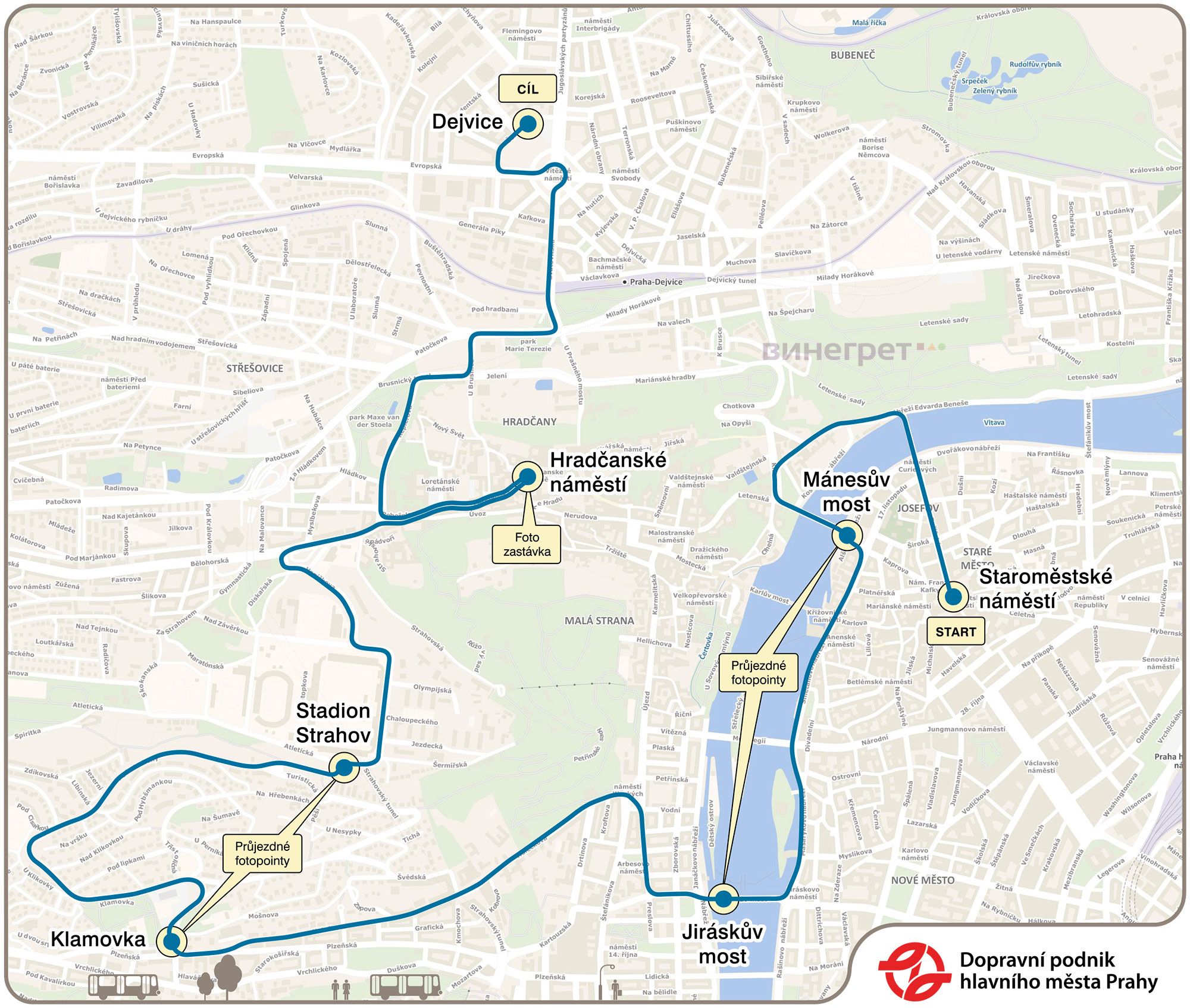
The event is free to attend and is expected to draw large crowds of transport enthusiasts, families, and tourists.
Would you like us to write about your business? Find out more
This Saturday, June 14, a public rally will take place on náměstí Jana Palacha at 2 pm as part of “No Kings” Day, a global day of action drawing attention to concerns about growing authoritarianism.
The event in Prague is being organized by Democrats Abroad Czech Republic together with the English-speaking Unitarian Church of Prague, and is part of a wider international movement happening in dozens of cities around the world.
The timing of the protests coincides with a large military parade in Washington, D.C., estimated to cost between $25 to $45 million, which critics have described as a show of power rather than a celebration of national values.
In response, demonstrations are being held in cities from Malmo to Mexico City, aiming to spotlight the importance of civil rights, democratic norms, and collective action.
In Prague, attendees can expect short speeches, public readings, and space for people to bring their own posters or messages. Organizers say the gathering is open to anyone who supports democracy and civil liberties, not just American citizens.
“We’re seeing more people speak out against rising authoritarianism,” said Martha McDevitt-Pugh, chair of Democrats Abroad International. “These global events are about standing together and showing solidarity with those resisting fear-based politics back home.”
The Prague event aims to bring together both American expatriates and local residents who want to express their support for democratic principles in a peaceful, community-oriented setting.
Would you like us to write about your business? Find out more
Prague is preparing for a surge in tourism, thanks to a new Dan Brown novel that will soon come to life on Netflix.
The bestselling author behind Angels & Demons and Inferno is set to release The Secret of Secrets on September 9, and the plot will once again follow symbologist Robert Langdon, who this time travels to Prague for a lecture — but, as expected in Brown’s universe, things quickly spiral out of control.
Although the book is yet to hit shelves, Netflix has already announced plans to adapt it into a feature film.
The film adaptation is likely to place Prague front and center, both on screen and in the minds of millions of viewers worldwide. According to Prague City Tourism, the opportunity is being embraced with enthusiasm.
Past experience shows that international productions can dramatically increase a city’s visibility and appeal. “With such a strong name and a global platform like Netflix, we expect increased interest from tourists,” said Klára Janderová from Prague City Tourism.
She cites the original Mission: Impossible film, shot in Prague in 1996, as a clear example. Featuring Tom Cruise, it was the first major Hollywood production filmed in the city and played a major role in positioning Prague as a top-tier film location.
Other international films have had similar effects. The 2015 Chinese romantic drama Only We Know Where, also filmed in Prague, became a major box office hit in China, drawing over a million viewers within its first three days. The film is credited with sparking a rise in Chinese tourism to the Czech capital.
Fans of James Bond may also recall Prague’s appearance in Casino Royale (2006), which marked Daniel Craig’s debut in the role. More recently, Netflix’s big-budget action film The Gray Man also featured scenes shot in the city.
Prague’s popularity among international film studios shows no signs of slowing. “It’s crucial that we continue to support this industry,” said Janderová. “The prestige is one thing, but there are also real economic benefits for the local economy.”
Would you like us to write about your business? Find out more
Cirque du Soleil will bring one of its most critically acclaimed shows, KURIOS – Cabinet of Curiosities, to Prague.
The first public performance will take place on September 3, 2025, and KURIOS will run until October 12, 2025. Tickets for this unique show are now available and would make a perfect Christmas gift.
Advance tickets are available now through Cirque Club, with general ticket sales started on December 13.
KURIOS will be performed in a giant tent specially designed for Cirque du Soleil performances.
For the first time in the Czech Republic, audiences will have the opportunity to witness the breathtaking artistry of Cirque du Soleil under its iconic big top, which can accommodate 2,500 spectators.
KURIOS – The Cabinet of Curiosities is widely acclaimed by critics and audiences alike.
True to the Cirque du Soleil signature style, the show combines breathtaking acrobatics with a refreshing blend of poetry, art, and humour. KURIOS offers an escape from reality, drawing audiences into a fantastical world inspired by steampunk, where dreams come to life.
50 artists from 21 countries bring a cabinet of curiosities full of bizarre characters to life, combining artistic masterpieces with humorous storytelling.
Premiering in Montreal in 2014, KURIOS has captivated over 6 million spectators in 35 cities worldwide, with more than 3,000 performances to date.
Would you like us to write about your business? Find out more
Czech skies could take on an unusual hue on Monday, June 9, as smoke from intense wildfires in Canada drifts over Central Europe, according to the Czech Hydrometeorological Institute (ČHMÚ).
The agency confirmed on Sunday that elevated levels of fine dust particles from Canadian forest fires have reached the upper layers of the atmosphere and will pass over the Czech Republic.
The most visible effects are expected on Monday morning, with sunrise and sunset potentially showcasing vibrant shades of orange and red.
“This is a textbook case of long-range atmospheric transport of suspended particles,” the ČHMÚ explained. “The highest concentration of smoke and dust is expected during the first half of the day on Monday.”
Already over the weekend, some residents in the Czech Republic observed the moon taking on a bright orange tint, a result of the smoke high above the horizon.
The smoke originates from large-scale wildfires that have swept across the Canadian provinces of Saskatchewan, Manitoba, and Ontario since May. These fires have led to mass evacuations, significant health warnings, and disruptions in oil production.
Although the smoke’s presence may create striking visual displays, its impact on public health is expected to be minimal, at least for now. The smoke is currently concentrated in the higher levels of the atmosphere, meaning it won’t affect ground-level air quality—a key factor in potential health risks.
Events like this are not unprecedented. The Czech Republic has previously been impacted by smoke from North American wildfires, as well as Saharan dust storms and smog from Poland’s coal-based heating systems.
Would you like us to write about your business? Find out more
The Czech Republic is reshaping its immigration policy, introducing tougher quotas for work and business visas in an effort to control who gets to live and work in the country long-term.
The new system prioritizes skilled labor—particularly Indian IT professionals—while sharply limiting the number of visas for low-skilled workers from China and several African nations.
Starting July 1, 2025, these changes will apply to applications for visas allowing stays of over 90 days.
The aim is to ensure that Czech embassies are not overwhelmed by applications from unqualified laborers, while still attracting professionals deemed beneficial to the economy.
India’s Tech Talent Welcomed
One of the most striking shifts is the expansion of the Digital Nomad visa program for Indian nationals. Although the government approved this policy in August 2023, it will come into effect next year. The Czech Coordination Authority for State Border Protection and Migration Management formally authorized the update.
Qualified Indian professionals, especially in IT, engineering, natural sciences, and mathematics, are seen as valuable assets. Many of these individuals are expected to work with Czech companies in semiconductor development and technical research.
The Digital Nomad scheme, which allows self-employed foreigners to live and work in the Czech Republic, will now accept 48 Indian applicants annually, up from 24. Though the numbers remain modest, officials say the symbolic opening marks a strategic pivot toward more targeted migration.
China’s Quotas Slashed Amid Surging Applications
The Czech state is clamping down on migration from China—especially low-skilled labor. In 2024 alone, Chinese nationals submitted over 1,300 employment card applications at Czech embassies in Beijing and Shanghai—up dramatically from just 235 in 2022. This trend is expected to continue into the first half of 2025.
Officials say the vast majority of Chinese applicants are seeking jobs in street food stalls and kitchens, often employed by other Chinese business owners. Because these jobs offer low wages and little room for career advancement, the Czech government is capping Chinese work visa applications at 1,170 per year.
African Countries Face Cutbacks Over Security Concerns
The Czech Republic is also reducing quotas at five embassies in Africa—Addis Ababa, Cairo, Lusaka, Pretoria, and Rabat—citing security and logistical concerns. According to government data, applicants from these countries tend to be poorly educated, lack clear motivation, and often misuse the visa process to reach other parts of the EU.
The report adds that many such migrants are entirely dependent on smugglers, lack preparation for legal migration procedures, and pose a high risk of vulnerability. These findings are echoed by Czech immigration police stationed abroad.
Other Key Changes to Quotas
The July 2025 update also includes several other country-specific adjustments: Japan and Taiwan will now face new quotas. Many applicants from these locations are actually Vietnamese nationals with long-term residency, who are considered low-skilled.
Thailand’s quotas are being increased under the Skilled Worker Program, acknowledging long-term demand. The Czech government emphasizes that future policies should support entrepreneurs and specialists, not manual labor.
Would you like us to write about your business? Find out more
Czechia’s Ministry of Health has unveiled a draft regulation that would tighten restrictions on electronic cigarettes, particularly those that feature pictures of animals or characters appealing to children.
The proposed measures, which must be approved by the European Commission, are intended to bring the country’s laws in line with broader public health goals across the EU.
Under the new rules, e-cigarettes and their refills will no longer be allowed to resemble toys, sweets, or display images of animals or characters appealing to minors.
Products may not contain sweeteners, cannabis extracts, psychoactive substances, anabolic steroids, or hormones. Labels with cartoon aesthetics, gaming references, or fantasy motifs would also be banned.
The regulation is a direct response to growing concern over the soaring popularity of vaping among Czech youth.
According to the State Institute of Health (SZÚ), 13.9% of the population used electronic cigarettes in 2023—up from less than 5% five years ago. Nearly one in four people aged 15–24 vape regularly, and about 15% of users started before the legal age of 18.
Although originally promoted as a safer alternative to tobacco, e-cigarettes are now being widely used by people who have never smoked traditional cigarettes.
The Ministry highlights that nearly 20% of current e-cigarette users in Czechia are non-smokers, suggesting that flavored and brightly packaged devices are drawing in new users rather than helping existing smokers quit.
One of the ministry’s primary concerns is the impact of nicotine on adolescent brain development. “Young brains form synapses faster than those of adults. As a result, teenagers are more susceptible to addiction,” the Ministry stated. Research suggests that nicotine can damage areas of the brain linked to attention and learning, with long-term consequences extending into adulthood.
The new regulation would also address labeling inconsistencies. Currently, manufacturers list nicotine levels in varying units—some use percentages, others grams per milliliter—which can mislead consumers. The ministry wants all products to state nicotine content uniformly, making comparisons easier and increasing transparency.
Another major change would expand the list of banned ingredients in e-liquid refills and possibly establish maximum limits for certain additives. While existing laws require nicotine warnings on packages containing the substance, the Ministry argues that all vaping products should carry such warnings, since nicotine-free refills can be swapped out for those containing nicotine.
Would you like us to write about your business? Find out more
On June 4th, Prague’s food scene welcomed a bold new arrival.
Seven North, a dining concept already making waves in Vienna, opened inside the Sir Prague Hotel, located just a short walk from the Vltava River. The restaurant introduces a fresh take on Mediterranean cooking, where food becomes a kind of performance and tradition is joyfully disrupted.
Set in an eclectic interior designed by Linda Boronkay, the space reflects the spirit of the kitchen: bold, instinctive, and unpredictable.
Behind the concept is chef Eyal Shani, whose more than 40 restaurants worldwide have built a cult following. B
Dishes are based on Mediterranean roots, with occasional detours into Italian, French, and German inspirations. But for Shani, what matters most isn’t geography—it’s intuition.
The menu changes daily, depending on what’s in season or available. It’s handwritten in Comic Sans, a playful detail that matches the restaurant’s unpretentious approach.
Guests might share bruschetta with roasted nectarines and cheese, focaccia with sour cream and marinated peppers, eggplant sashimi, steamed spinach with parmesan, or baked potato with a tangy salad.
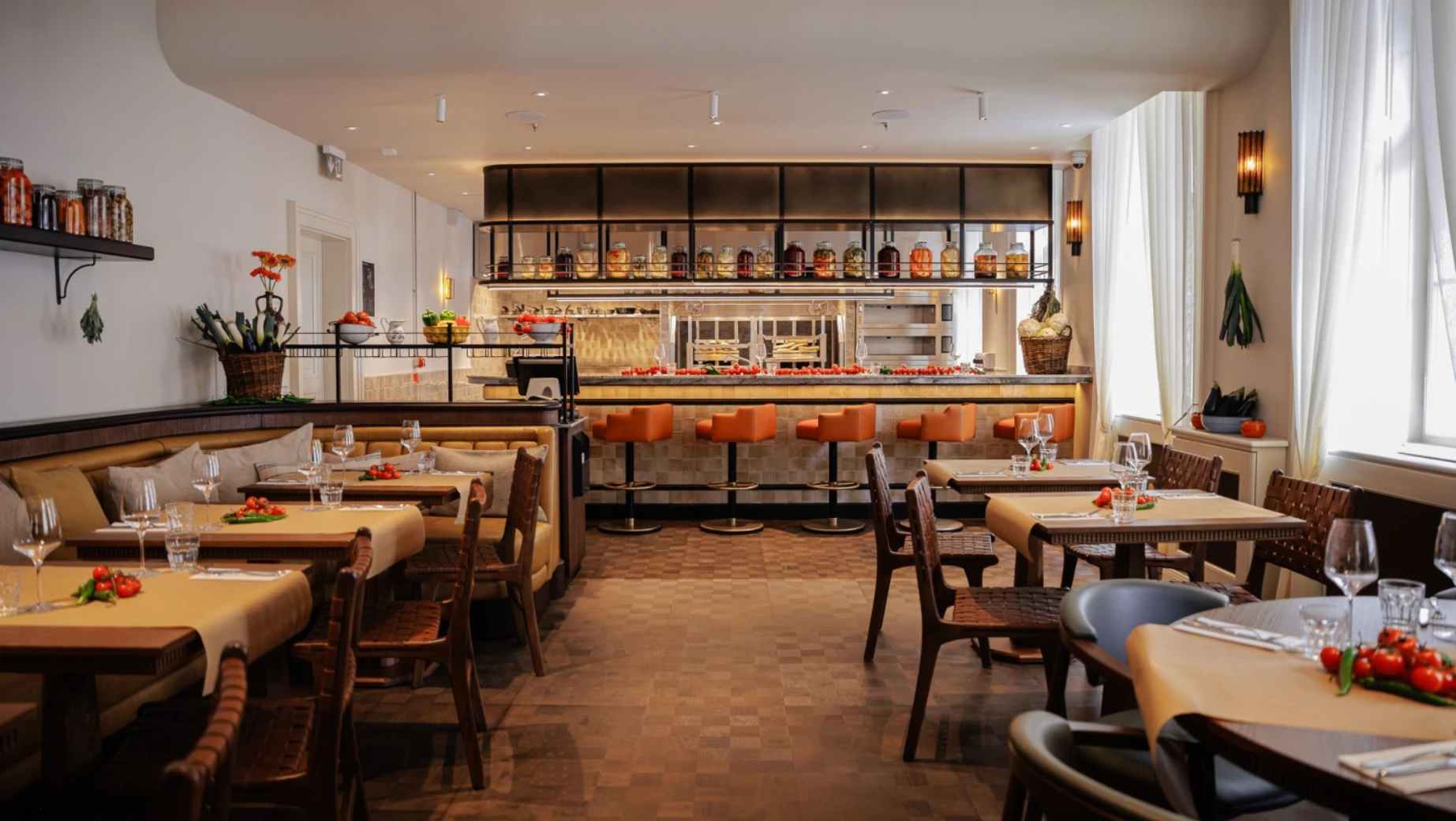
There are also mussels, shrimp, perfectly grilled fish, lamb chops, and handmade ravioli with a sage butter sauce.
The cooking relies on simple ingredients: olive oil, salt, and fresh herbs. You won’t find much flour—either in the starters or desserts—and spices are minimal.
Vegetables, especially raw salads, take center stage. If something falls off your plate, don’t worry. There are no tablecloths—just a wide strip of disposable paper covering each table, replaced after every guest.
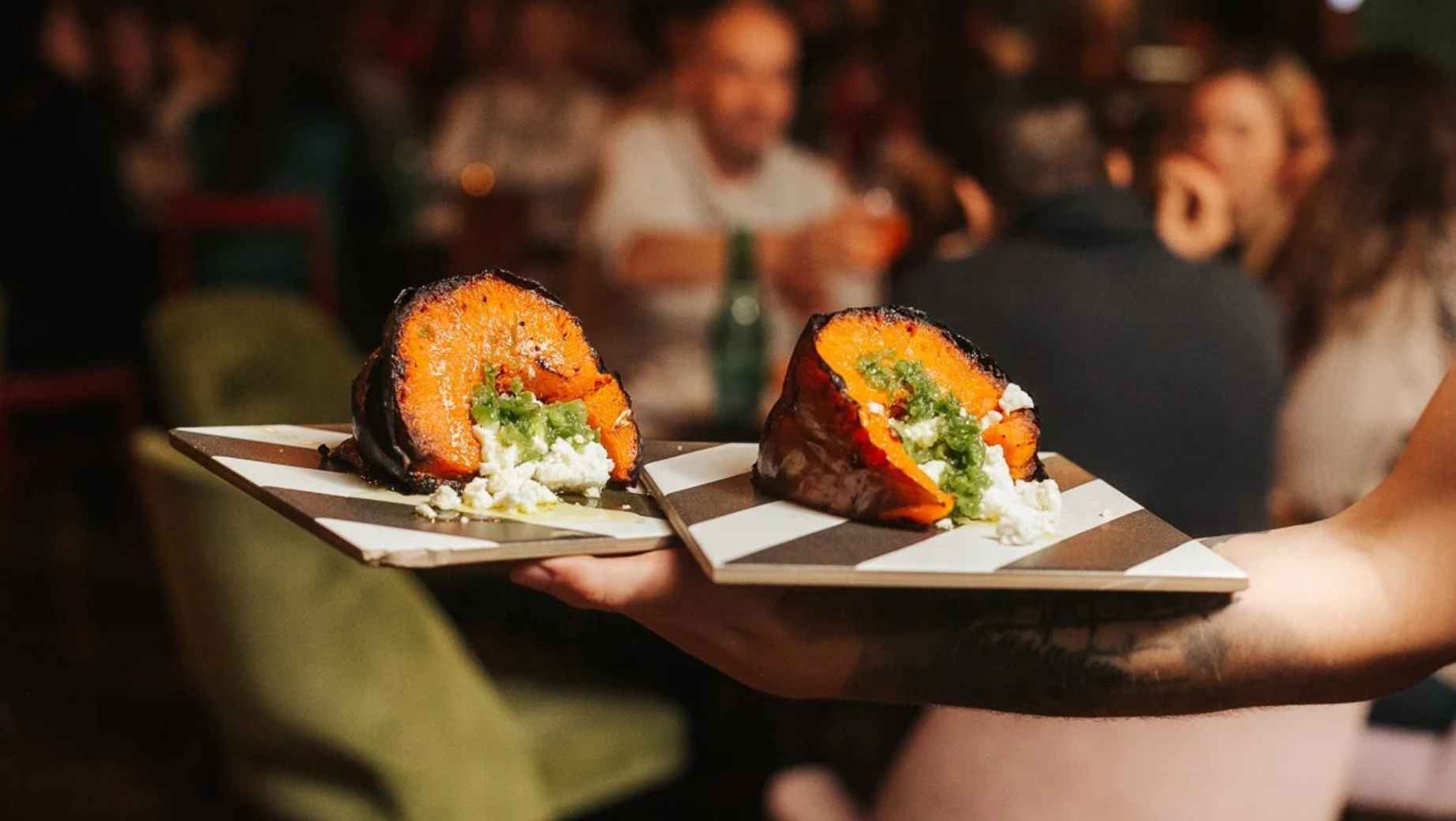
The menu is structured by ingredient type—bread, vegetables, meat, fish and seafood—with each dish made to serve two to three people.
The best way to enjoy it? Come hungry and with friends. The meal is designed to unfold gradually, dish by dish, with the atmosphere enhanced by funky, laid-back music.
Visualizza questo post su Instagram
The Prague location joins the successful Vienna branch of Seven North and is part of the Sircle Collection, a European hospitality brand known for blending design and culture.
The Sir Prague Hotel—a restored neo-Renaissance building from 1884—opened just two months ago and is operated by the Amsterdam-based Sircle Hospitality Group, led by entrepreneur Liran Wizman.
Wizman’s group manages more than 37 boutique hotels and 35 restaurants and bars across 23 European cities.
Would you like us to write about your business? Find out more
After a five-year pause, Prague has officially reconnected with Canada via direct flights, as Air Canada resumes its non-stop service between Toronto and the Czech capital.
The first plane is set to land at Václav Havel Airport on Friday, June 7, shortly after noon, marking the return of a route that disappeared during the Covid-19 pandemic.
The Airbus A330-300, with a capacity of 297 passengers, will operate three times per week — departing from Toronto every Sunday, Tuesday, and Friday (due to the time difference), and returning from Prague on Mondays, Wednesdays, and Saturdays. Each leg of the journey will take approximately nine hours.
This move is part of a broader expansion of long-haul connections at Václav Havel Airport, which now offers flights to 165 destinations.
In recent days, Etihad Airways also launched a direct route to Abu Dhabi, joining an already diverse network that includes New York, Dubai, Doha, Seoul, Beijing, Taipei, and Riyadh.
Josef Trejbal, director of the Czech ticketing platform Letuška.cz, says demand for travel to Canada was strong even before the new direct route launched. “We normally sell hundreds of tickets to Canada each month, but now we expect that number to increase significantly,” he noted.
Toronto’s role as a major North American hub also makes it easier for passengers from Prague to reach other Canadian cities such as Montreal, Vancouver, or Winnipeg with just a single stop.
Airport officials are optimistic about the broader outlook for air travel in 2025.
After welcoming over 16.35 million passengers last year, Prague Airport now anticipates surpassing its all-time high from 2019, when it served 17.8 million travelers. This year’s forecast projects over 18 million passengers, underscoring the ongoing recovery in global aviation.
Would you like us to write about your business? Find out more
Prague police are searching for a man caught on security cameras after two separate sexual assaults occurred on Monday morning in the city’s southwest.
According to police spokesperson Jan Rybanský, the man first assaulted a woman on the Nové Butovice metro platform and then attacked a second victim shortly afterward in a nearby park.
In both cases, the attacker approached his victims from behind, groping them inappropriately.
“In the first incident, he grabbed a woman by the buttocks while she was boarding the metro train at Nové Butovice,” said Rybanský.
Just minutes later, the same man allegedly followed a 22-year-old woman up a staircase in a nearby park. He reportedly groped both her buttocks and genitals before fleeing the scene.
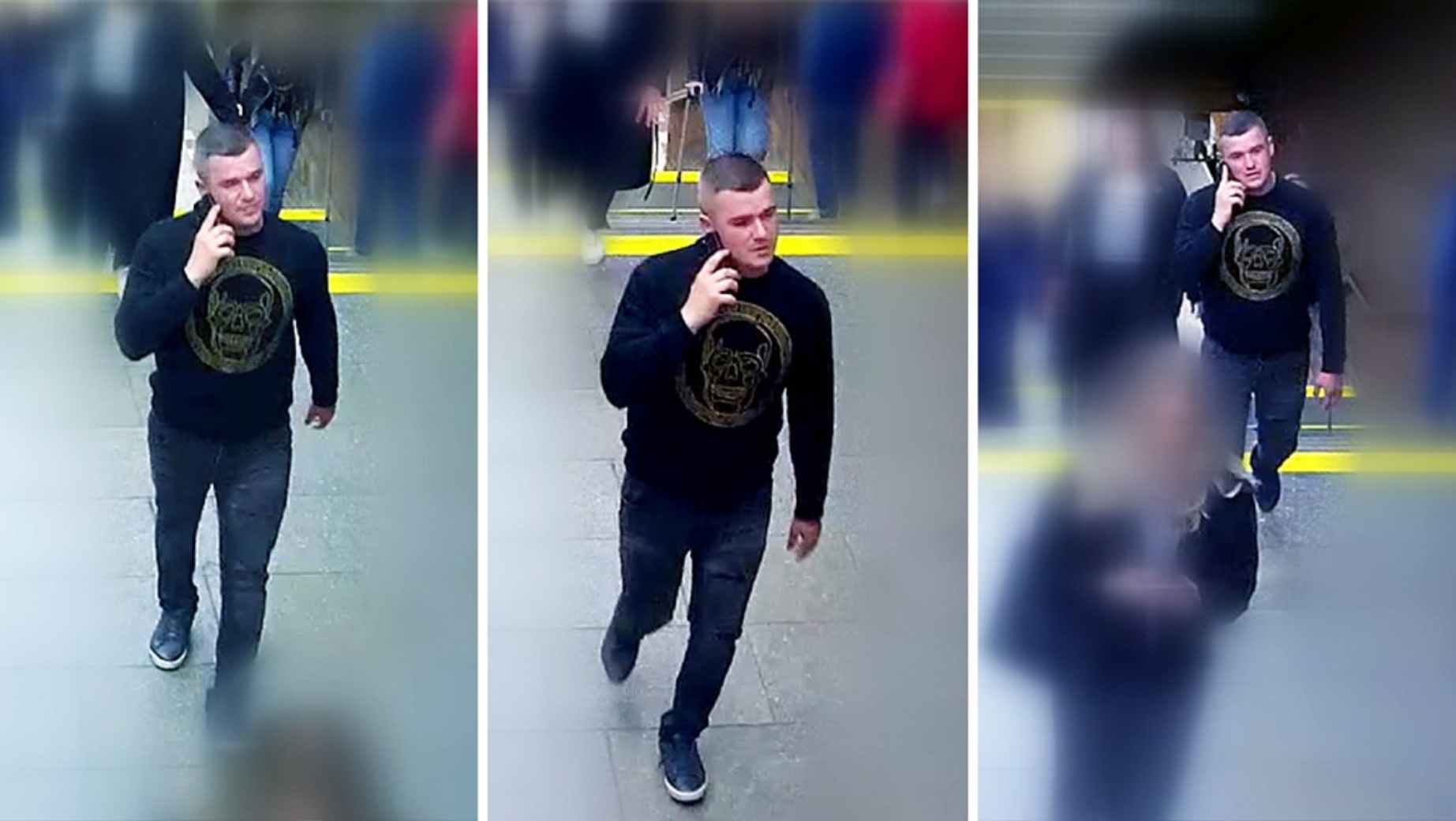
Police have released clear CCTV images of the suspect in hopes the public can help identify him.
The footage shows a man with a medium build and light skin, wearing very short dark hair. At the time of the assaults, he was dressed in dark trousers, black and white sneakers, and what appeared to be a black sweatshirt with a large skull symbol in a yellow or gold circle.
Authorities are asking for the public’s help.
“If you recognize this individual, please call the 158 police hotline immediately,” said Rybanský. “We are also urging any other women who may have been assaulted by this man to come forward and report their experiences.”
Would you like us to write about your business? Find out more
Be it at lunch or dinner, with friends in a restaurant, or at home with a takeaway, there’s no bad time to eat pizza. And no one knows that better than the Top 50 Pizza Awards.
London’s Napoli on the Road has been named the best pizzeria in Europe for 2025, according to the highly-regarded 50 Top Pizza guide.
Baldoria in Madrid came second on 50 Top Pizza’s ranking. Its signature Búfala Fest pizza featured on our own list, with Time Out Madrid’s editor Gorka Elorrieta calling it ‘a delightful surprise for cheese lovers’.
In third place was a tie between Sartoria Panatieri in Barcelona and Via Toledo in Vienna – though the most represented city overall was none other than Paris.
The rest of the prestigious list features a mix of established and rising stars. London scores another win with 50 Kalò, owned by Ciro Salvo, coming in fourth. Madrid’s Baldoria, owned by Ciro Cristiano, follows closely in fifth place, also bagging the award for best pasta dish.
Pizza Nuova in Prague ranks #27:
“Not only the oven but also the classic Neapolitan style of the pizzas is certified by the establishment’s membership to the Associazione Verace Pizza Napolitana. The pizza is the focal point around which a varied gastronomic offer rotates, from the pasta to the salads, to the ice-creams. All of them are icons of Italian cuisine,” says 50 Top Pizza.
Spain is confirmed as the best-represented country in the guide, followed by France and Germany. The first 20 pizzerias on the ’50 Top Pizza Europe’ list will automatically qualify for the ranking of the 100 best pizzerias in the world.
Given that there are some 63,000 pizzerias in Italy alone, the website states that no Italian restaurant was included on the list. The list is based on a survey that was carried out after an anonymous judging visit.
Three Pizzerias Also Make the ‘Excellent’ List
Three Prague pizzerias—Da Pietro, Sasy the Original, and Slice Slice Baby—earned a spot in the “Excellent Pizzerias” section.
Although not ranked in the official top 50, their inclusion in this curated list signals outstanding quality, authentic recipes, and a strong reputation among pizza lovers.
Would you like us to write about your business? Find out more
Queen Máxima of the Netherlands donated a bell, partly made from Russian weapons, to a church in Prague as a sign of solidarity with Ukraine on 5 June.
The Freedom Bell was made by the Dutch workshop Royal Eijsbouts, which used pieces of artillery shells and other weapons used by Russia in its war of aggression against Ukraine.
“This bell has a lot of symbolism in it and it’s a very special project for us,” the owner of the bell foundry, Joost Eijsbouts, told Czech media. “To use material designed for violence and turn it into something peaceful is a good idea.”
The bell will be installed in the tower of the Church of the Holy Saviour in Prague, replacing one of the original bells that the Austro-Hungarian army took and turned into weapons during World War I.
The ceremony at the church, attended by Czech President Petr Pavel and his wife Eva, was to be one of the highlights of the Dutch royal couple’s visit to Prague.
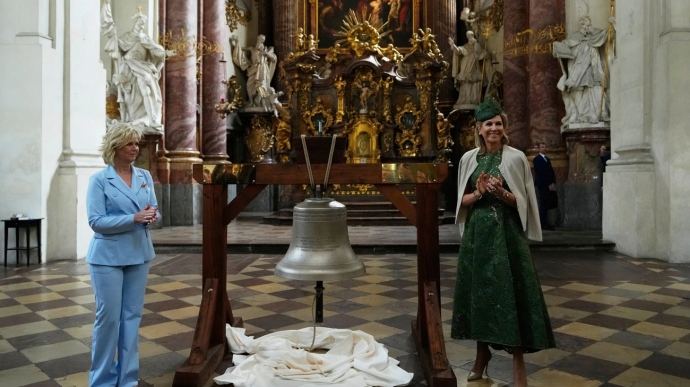
However, King Willem-Alexander was forced to cut short his trip and return home late on the evening of 4 June due to the fall of his government.
In March, Ukrainian Foreign Minister Andrii Sybiha presented US Secretary of State Marco Rubio with an icon of the Virgin Mary made from an ammunition box.
In 2023, the then-Lithuanian Defence Minister Arvydas Anušauskas was presented with a piece of a downed Shahed drone during a trip to Ukraine.
